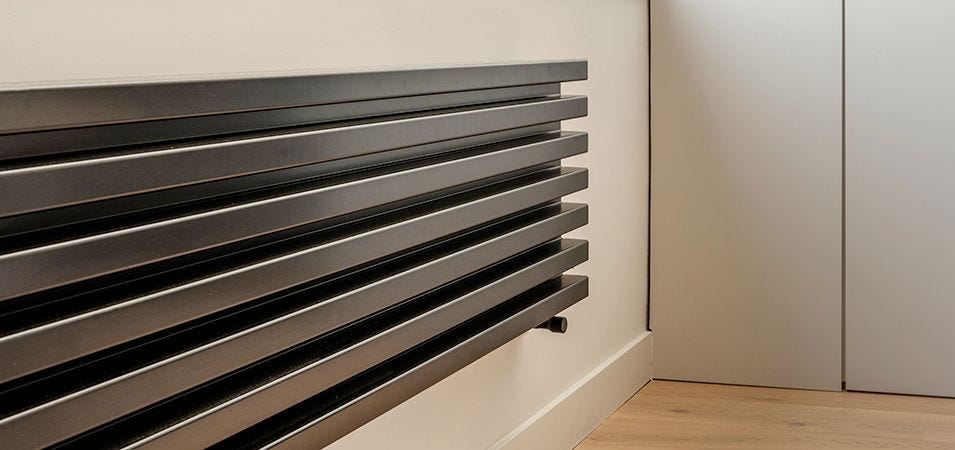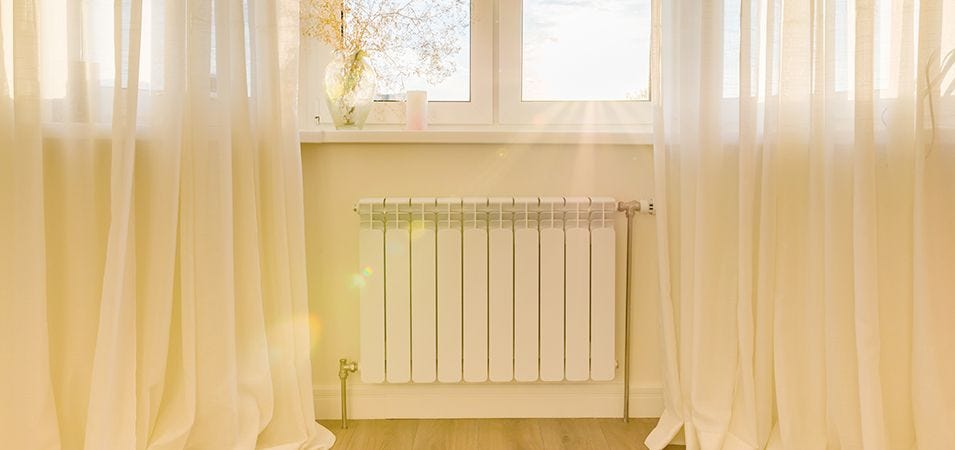How to deal with a noisy radiator
When you switch on your central heating system, and the hot water starts flowing, it should come on quietly smoothly and efficiently. It's the sign of a well-maintained system, and you should have your boiler checked every 12 months in order to keep things running well. However, there are times when you might experience a noisy radiator or pipes and hear noises such as knocking, banging, creaking or ticking and they can be a bit annoying, if not disconcerting.
Sometimes, noisy radiators or pipes are not really anything to worry about and are often part and parcel of having a central heating system. However, in some circumstances these noises could be a sign of something more serious and in need of further investigation. There are numerous reasons why you might hear noises coming from your radiators or pipes. A lot of the noises differ from one another and the type of noise can help to shed light on the source of the issue and whether or not it's actually a problem.
In this post, we'll explore why your radiators might be making a noise and what steps you can take to reduce or resolve the problem.
What can cause gurgling & whistling sounds in my heating system?
Issue
Gurgling and whistling sounds in a heating system are often caused by trapped air or debris, such as limescale, somewhere in the pipes. Air pockets can create gurgling noises as water is forced past them, while whistling sounds may result from water flow restrictions due to debris or partially closed valves.
Solution
To resolve the annoying gurgling sounds, bleed your radiators to release trapped air. Start with the radiator closest to the boiler and work your way outwards. If whistling persists, check and clean any filters and ensure that all valves are fully open. If the problem continues, it might be necessary to flush the system to remove limescale or other debris. If you need replacement radiator valves, be sure to check our selection.
Why are my pipes ticking or clicking?
Issue
Ticking or clicking sounds typically occur due to the expansion and contraction of old, copper pipes as they heat up and cool down. This can cause the pipes to rub against things that are in close proximity, such as walls, floorboards, brackets or joists, resulting in these strange noises. In many cases, these noises are often not problematic and are simply a quirk of an old house and heating system. However, a noise that gets louder over time could be a sign that one of your pipes is not securely fastened. A loose pipe could weaken over time and potentially cause serious damage.
Solution
Employ a professional to check any loose pipes if you can't locate them yourself. Floorboards may need removing, which may be best left to an expert. Securely fixed pipes are much less likely to come into contact with another surface so should not only reduce noise but also help future-proof additional weakening of the pipes. Replacing old, copper pipes with modern plastic piping may also resolve this issue.
Why is my radiator making a banging noise?
Issue
Banging noises in radiators often indicate a problem known as "water hammer." Water hammering tends to be caused by water flowing one way in your system then having to flow in the opposite direction when a tap is turned on. It's this sudden change in direction of the water flow that causes the banging and usually stops once the tap is turned off. While not an immediate cause for concern, this can cause a weakening of pipe joints over time if left unchecked.
Solution
Check the water pressure in your heating system and adjust it to the recommended level (usually around 1-1.5 bar). Inspect the radiator valves to ensure they are fully open, functioning correctly and that your radiators are properly balanced. If the water hammer persists, consider installing a water hammer arrestor to absorb the shock waves and prevent banging.
- Read more: How to balance a radiator: a complete guide
Why does my heating system make a rattling noise?
Issue
Rattling noises in a heating system can be caused by loose components, such as loose pipes (mentioned above), fittings, or radiators. The vibration of the system as water flows around it can cause these components to rattle against each other or other surfaces.
Solution
Have a look around your heating system for any parts that have become loosened. Tighten any loose fittings and secure any loose pipes with additional brackets or clips. Check the radiators to ensure they are securely mounted to the wall. If the rattling persists, it may be necessary to call a professional to inspect further and locate the source of the noise.
- Read more: How to fix a radiator rattling
Can a heating system dripping noise indicate a leak?
Issue
Certain noises can indicate a leak in your heating system. Hissing or dripping sounds are common indicators of a leak. Hissing can suggest a pressure leak, while dripping points to water escaping from a joint or connection.
Solution
Leaks are not something that resolve themselves and a small leak can very quickly become a big one, so it's important to act quickly. Inspect the system for visible signs of leaks, such as water stains or damp patches around pipes, joints, and radiators. If you suspect a leak but cannot find its source, it may be necessary to call a heating engineer to perform a more thorough inspection and repair any leaks.
What causes the trickling water sound in my radiators?
Issue
A trickling water sound in radiators is most often caused by air trapped in the system, creating pockets where water flows unevenly. This can also occur if the system is not balanced properly, causing uneven water flow through the radiators.
Solution
Bleed the radiators to remove any trapped air. Start with the radiator furthest from the boiler and work your way towards it. After bleeding the radiators, check the system's balance by ensuring that each radiator heats up evenly. If necessary, adjust the radiator valves to balance the flow of water throughout the system. If the trickling sound persists, consider flushing the system to remove any sludge or debris.
If you are looking for a replacement valve, be sure to browse our full range to find something suitable for you.






